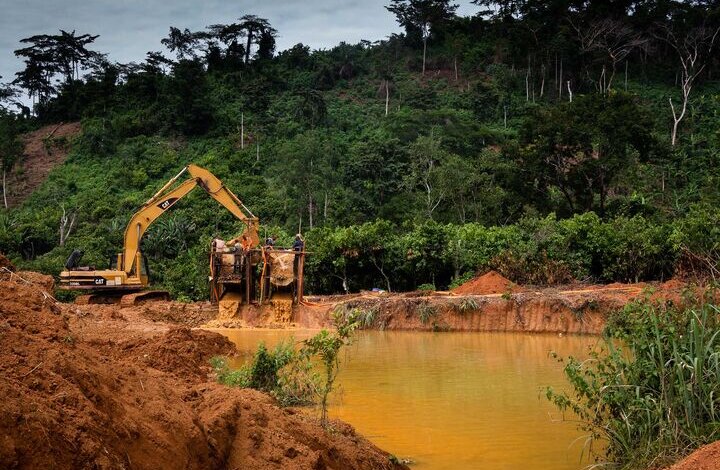Ghana: implications of disbanding Anti-Galamsey Task Force

Illegal mining, known as ‘galamsey‘, has long been a concerning issue in Ghana, causing significant environmental degradation and threatening the livelihoods of many communities. In response to this problem, the Ghanaian government established an Anti-Galamsey Task Force to crack down on illegal mining activities and protect the country’s natural resources.
However, recent reports indicate that the government has decided to disband this task force, raising questions about the reasons behind this decision and the potential consequences for Ghana and its economy.
In this article, we will delve into the factors contributing to the removal of the Anti-Galamsey Task Force, the likely repercussions for Ghana and its economy, and the measures that must be implemented to safeguard the land, forests, and water bodies in the absence of the task force.
Understanding the disbandment
The decision to disband the Anti-Galamsey Task Force has stirred controversy and speculation about the motives of the Ghanaian government. While official explanations for this move have not been provided, conjectures suggest that political pressures or concerns of corruption within the task force might have played a role in the decision.
Additionally, there are suggestions that the task force might not have achieved the intended impact in curbing illegal mining, thus prompting its dissolution.
Its consequences for Ghana
The removal of the Anti-Galamsey Task Force could have far-reaching consequences for Ghana, encompassing environmental, social, and economic ramifications. With no dedicated task force to monitor and enforce anti-galamsey regulations, illegal mining activities are likely to escalate, leading to further deforestation, pollution of water bodies, and degradation of biodiversity.
This poses a severe threat to the sustainability of Ghana’s natural resources and endangers the wellbeing of communities reliant on these resources for their livelihoods.
Furthermore, illegal mining not only undermines environmental integrity but also impacts Ghana’s economy negatively. The loss of revenue from the mining sector due to illegal activities could deprive the government of essential funds, exacerbating economic challenges.
Moreover, the long-term effects of environmental degradation from illegal mining, such as reduced agricultural productivity and health hazards from pollution, could further strain the economy and public health infrastructure.
Addressing the protection of land, forests, and water bodies
In light of the disbandment of the Anti-Galamsey Task Force, urgent measures must be implemented by the Ghanaian government and relevant agencies to safeguard the country’s natural resources. Enhancing regulations, monitoring mechanisms, and enforcement practices are imperative to deter illegal mining activities and promote sustainable mining practices.
Collaboration with local communities, civil societies, and international partners is crucial to raising awareness about the detrimental impacts of illegal mining and fostering alternative livelihood options in affected regions.
Effective monitoring and surveillance technologies, such as drones and satellite imagery, should be utilized to detect and prevent illegal mining activities.
Strengthening legal frameworks, increasing penalties for offenders, and bolstering regulatory capacities are essential to ensure compliance with environmental regulations and hold accountable those responsible for illegal mining operations.
Setbacks caused by political figures encouraging illegal mining
Addressing the alarming statements made by political figures, such as the Amenfi East NPP PC, who incite illegal miners by suggesting they can disobey soldiers attempting to uphold the law, presents a significant challenge.
The presence of government officials, including the Western Regional Minister, at such events further complicates the situation and undermines efforts to curb illegal mining. Ernest Frimpong’s revelation that all anti-galamsey task forces have been disbanded further exacerbates this issue, as it signals a lack of authority to enforce regulations on illegal mining activities.
Its impact
The endorsement of illegal mining by political figures not only emboldens illegal miners but also undermines the rule of law and environmental conservation efforts in Ghana. The presence of high-ranking officials at events promoting illegal activities sends a dangerous message that defying regulations and engaging in unlawful practices are acceptable.
This could lead to a resurgence of illegal mining activities, exacerbating environmental degradation and threatening the sustainability of Ghana’s natural resources. It is imperative for the Ghanaian government to swiftly implement measures to combat illegal mining, strengthen regulations, and enforce compliance with environmental laws.
Collaborative efforts with stakeholders, enhanced monitoring technologies, and strict enforcement measures are essential to mitigate the adverse effects of illegal mining and ensure the long-term preservation of Ghana’s natural resources.
Author
Papa Kwasi Dentsil-Koomson (MCS, CMSC, BC, BF) is the CEO / MD of Mineserve Engineering Ghana Limited (MEGL) and Managing Member of Great Nevada Oil & Gas Exploration LLC, USA. He is also a certified Private Investigator, Counter Terrorism & International Relation Professional.
His expertise includes engineering & construction project management, oil & gas industry operations, markets & drilling, risk analysis and economic crime investigations with over 15 years of experience.

Disclaimer: The views and opinions expressed in articles and content by our contributors are those of their’s and do not necessarily reflect the official policy or position of our publication. We make every effort to ensure that the information provided is accurate and up-to-date, while holding contributing authors solely responsible for their contributions.





